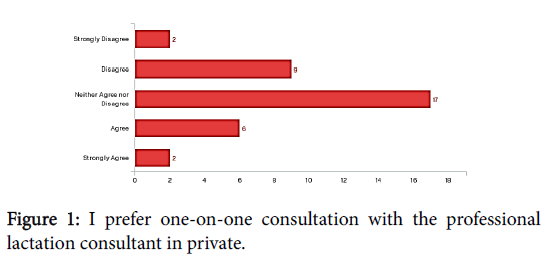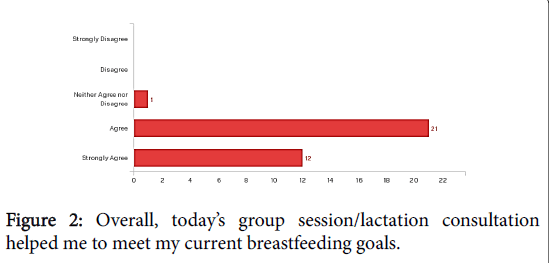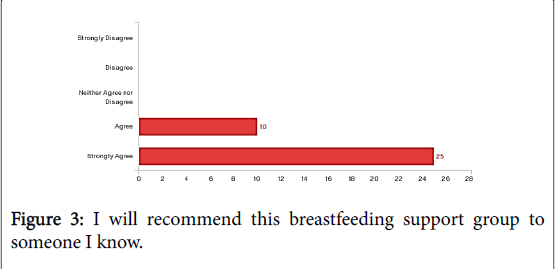Research Article Open Access
Impact of Mother's Breastfeeding Support: Lactation Support Provided in a Group Setting
Joanne Silbert-Flagg*, Emily Balbier and Casi Blakey
Department of Acute and Chronic Care, John Hopkins School of Nursing, Wolfe Street, Baltimore, USA
- *Corresponding Author:
- Joanne Silbert-Flagg
Department of Acute and Chronic Care
John Hopkins School of Nursing
Wolfe Street, Baltimore, USA
Tel: 410-955-4766
E-mail:jsilber1@jhu.edu
Received date: August 04, 2016; Accepted date: August 24, 2016; Published date: August 31, 2016
Citation: Flagg JS, Balbier E, Blakey C (2016) Impact of Mother’s Breastfeeding Support: Lactation Support Provided in a Group Setting. J Preg Child Health 3:274. doi:10.4172/2376-127X.1000274
Copyright: ©2016 Flagg JS, et al. This is an open-access article distributed under the terms of the Creative Commons Attribution License, which permits unrestricted use, distribution, and reproduction in any medium, provided the original author and source are credited.
Visit for more related articles at Journal of Pregnancy and Child Health
Abstract
Many hospitals provide breastfeeding support groups to new mothers. How effective is the support and education providing in promoting breastfeeding success? The following is preliminary data from an on-going study to evaluate the effectiveness of a Mother’s Breastfeeding Support Group conducted at Johns Hopkins Hospital as part of their Baby Friendly Initiative.
Keywords
Breastfeeding; Lactation; Support group; Mothers; Online survey
Background
Breastfeeding benefits and challenges
Breastfeeding has several health and nutritional benefits, including antimicrobial, anti-inflammatory, immunological factors and provision of vitamins and minerals [1]. According to the Centres for Disease Control and Prevention [2] less than half (49%) of infants born in 2011 were breastfeeding at 6 months and approximately a quarter (27%) of infants born in 2011 were breastfeeding at 12 months. The World Health Organization recommends that all infants be exclusively breastfed from birth to 6 months of age, and thereafter receive supplemental foods, but continue breastfeeding for at least 2 years [3]. There are significant disparities in the prevalence of breastfeeding initiation and duration in the United States. Barriers in high income countries can include obesity, returning to work, poor family support, embarrassment about feeding in public and lack of education [4].
Breastfeeding support group
It is hypothesized that a breastfeeding intervention held in a hospital-based group setting that incorporates the expertise of an International Board Certified Lactation Consultant (IBCLC) and the social connection with a peer (e.g. other mothers who are breastfeeding) will be more successful in achieving the mother’s breast feeding goals than lactation support provided by an IBCLC offered in a more traditional one on one consultation in a paediatric office. The group setting is thought to be more effective because exposure of mother’s breastfeeding in a group helps to normalize it for other mothers. Additionally, women are bonding over a shared experience and gaining confidence with the support of their peers [4-6].
Objectives
To determine if a hospital-based breastfeeding support provided in a group setting is more effective in achieving the mother’s breastfeeding goals than support provided in the traditional one-on-one consultation.
The goal of the intervention is to increase the proportion of infants who are breastfed to achieve the Healthy People 2020 goals [7]. These goals include increasing infants who have ever breastfed to 81.9%, infants who breastfed to 6 months to 60.6% and infants who breastfed for 1 year to 34.1%.
Methods
The intervention was the mother’s breastfeeding support group with the lactation consultant Dr. JoAnne Silbert-Flagg, DNP, CRNP, IBCLC. The sessions were held weekly and were offered at no cost to mothers who delivered at Johns Hopkins Hospital. An online survey tool on Qualtrics was sent out to all mothers to collect demographic information and breastfeeding goals. An example of the measures studied is provided in Table 1.
| a)Support group/individual consultation met the mother's’ needs |
| b)Assisted with meeting breastfeeding goals |
| c)If the lactation consultant made the mother feel supported |
| d)Whether they practiced the techniques provided |
| e)Prefers and individual/group session over the group/individual session |
| f)Felt supported in the group/individual session |
| g)Changed the mother’s breastfeeding goal |
| h)The mother would recommend the breastfeeding support group/individual consultation to others |
Table 1: Measures about mothers’ perceptions of the breastfeeding support group or one-on-one consultation.
Following data collection, logistic regression will be used to test the hypothesis that the hospital-based mother’s breastfeeding support group was statistically significant in achieving the mother’s breastfeeding goals over the comparison group, a traditional one-onone consultation in a paediatric office. Likert scale will allow analysis of covariance to determine the degree to which the mother’s breastfeeding goals were achieved. Analysis of covariance will be used to compare secondary outcomes to determine the overall satisfaction and the degree to which participants would recommend the breastfeeding program to others.
Results
There have been 36 respondents to the survey thus far. The goal is to have 100 respondents in each of the settings: group setting in the hospital and individual setting in a paediatric office. A sampling of the preliminary results is shown below.
Participants found the session to help meet their breastfeeding goals and would recommend the breastfeeding support group to someone they know (Figures 1-3).
Conclusion
Preliminary results show that the breastfeeding group has been successful in meeting mothers’ breastfeeding goals. More results are needed to determine the effectiveness of the group setting compared to one-on-one. The mothers’ indicated that they would recommend the group to others they know but more advertising should be done throughout the hospital.
Future Directions
Improve response rate by providing easy access to the QR code for the Qualtrics Survey at the end of sessions.
Incorporate education about the breastfeeding support group into NICU discharge checklist.
Implement this study in more hospitals, specifically those that are seeking baby friendly status, and in private lactation consult practices.
Administer surveys immediately after support group or one on one consult to help increase response rates.
Apply for additional grant funds to provide more supplies to breastfeeding mothers.
References
- Wambach K, Riordan J (2016) Breastfeeding and human lactation Boston, MA: Jones and Barlett Learning.
- Centers for Disease Control and Prevention (2014) Breastfeeding report card, United States/2014.
- Demirtas B (2012) Strategies to support breastfeeding: A review. International Nursing a Review 59: 474-481.
- Healthy People 2020.
- Hoddinott P, Chalmers M, Pill R (2006) One-to-one or group-based peer support for Breastfeeding. Women’s perceptions of breastfeeding peer coaching intervention. BIRTH, 33: 139-146.
- Skouteris H, Nagle C, Fowler M, Kent B, Sahota P, et al. (2014) Interventions designed to promote exclusive breastfeeding in high-income countries: A systematic review. Breastfeeding Medicine 9: 113-127.
- Vari PM, Camburn J, Henly SJ (2000) Professionally mediated peer support and early breastfeeding success. The Journal of Perinatal Education 9: 22-30.
Relevant Topics
Recommended Journals
Article Tools
Article Usage
- Total views: 12505
- [From(publication date):
August-2016 - Dec 18, 2024] - Breakdown by view type
- HTML page views : 11634
- PDF downloads : 871



